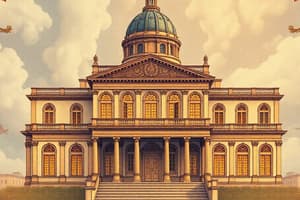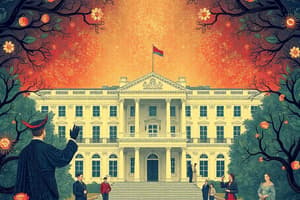Podcast
Questions and Answers
List the formal powers of the presidency.
List the formal powers of the presidency.
Veto power, command armed forces, pardoning power, appointment powers, make treaties, convene Congress.
List the informal powers of the presidency.
List the informal powers of the presidency.
The power to go public, power of persuasion, make executive agreements, issue executive orders, issue signing statements, create & use bureaucracy, personality and leadership, and make legislative proposals.
What is the primary job of the executive branch?
What is the primary job of the executive branch?
Ensure that laws of the U.S. are obeyed.
Where are the powers of the president found?
Where are the powers of the president found?
What are the qualifications to become president?
What are the qualifications to become president?
What happens if the president gets very ill or dies in office?
What happens if the president gets very ill or dies in office?
What are the 7 roles of the president?
What are the 7 roles of the president?
What is the Executive Office of the President?
What is the Executive Office of the President?
What are the 4 of the most important advisory groups?
What are the 4 of the most important advisory groups?
What are the 15 Cabinet Departments?
What are the 15 Cabinet Departments?
Describe formal presidential foreign policy powers.
Describe formal presidential foreign policy powers.
Describe formal legislative foreign policy powers.
Describe formal legislative foreign policy powers.
Explain informal executive powers in conducting foreign policy.
Explain informal executive powers in conducting foreign policy.
Explain how each informal executive power provides the president with an advantage over Congress.
Explain how each informal executive power provides the president with an advantage over Congress.
How long is the term of office for the president?
How long is the term of office for the president?
How can a president be removed from office?
How can a president be removed from office?
How is the president's power over treaties checked?
How is the president's power over treaties checked?
Flashcards are hidden until you start studying
Study Notes
Formal Powers of the Presidency
- Veto power: Ability to reject bills passed by Congress.
- Command armed forces: Authority to direct military operations.
- Pardoning power: President can grant pardons for federal offenses.
- Appointment powers: President appoints judges, ambassadors, and other officials.
- Make treaties: Power to negotiate and enter into treaties with foreign nations.
- Convene Congress: Can call special sessions of Congress.
Informal Powers of the Presidency
- Power to go public: Utilize media to influence public opinion.
- Power of persuasion: Ability to sway Congress and public to support initiatives.
- Make executive agreements: Arrange international agreements without Senate approval.
- Issue executive orders: Directives that manage operations within the federal government.
- Issue signing statements: Comments on the interpretation of laws upon signing.
- Create & use bureaucracy: Establish agencies to implement policies.
- Personality and leadership: Charismatic influence and leadership style.
- Make legislative proposals: Initiate bills or suggest legislation to Congress.
Primary Job of the Executive Branch
- Ensure that laws of the United States are duly enforced and followed.
Location of Presidential Powers
- Powers of the President are delineated in Article II of the Constitution.
Qualifications to Become President
- Must be a natural-born citizen or born on U.S. soil.
- At least 35 years old.
- Resident of the U.S. for at least 14 years.
Succession in Case of Presidential Illness or Death
- If the President is incapacitated, the succession order: Vice President, Speaker of the House, President Pro Tempore of the Senate, Secretary of State.
Roles of the President
- Chief of Executive Branch: Oversees federal administration.
- Head of State: Represents the nation and performs ceremonial duties.
- Foreign Policy Leader: Directs U.S. foreign policy.
- Commander in Chief: Leads the armed forces.
- Legislative Leader: Influences legislation and policy making.
- Economic Leader: Guides economic policy and growth.
- Political Party Leader: Heads political party and supports party initiatives.
Executive Office of the President
- Established in 1939 to assist the President in managing the executive branch through various offices.
Important Advisory Groups
- National Security Council: Advises on security issues.
- Council of Economic Advisers: Provides economic policy advice.
- Office of Management and Budget: Oversees budgetary processes.
- Office of the Vice President: Supports the Vice President's responsibilities.
Cabinet Departments
- Comprises 15 departments, including Agriculture, Commerce, Defense, Education, Energy, Health and Human Services, Homeland Security, Housing and Urban Development, Interior, Justice, Labor, State, Transportation, Treasury, and Veterans Affairs.
Formal Presidential Foreign Policy Powers
- Commander in Chief: Controls troop deployment.
- Appoint ambassadors: Fill key foreign policy positions.
- Negotiate treaties: Engage in formal international agreements.
- Recognize nations: Establish diplomatic relations.
- Receive ambassadors: Host foreign diplomats.
Formal Legislative Foreign Policy Powers
- Confirm ambassadors: Senate's role in approving nominees.
- Power of the purse: Congress controls military funding.
- Declare war: Congress holds authority to declare war.
- Pass laws/resolutions: Legislative control over foreign affairs.
- Regulate foreign commerce: Congress manages international trade.
- Ratify treaties: Senate approval required for treaties to take effect.
Informal Executive Powers in Foreign Policy
- Executive agreements enhance flexibility and speed in foreign relations.
- Access to media assists in shaping public perception.
- Agenda setting allows the President to prioritize issues.
- Meetings with world leaders build diplomatic relations.
- Crisis management provides immediate decision-making authority.
- International coalition building strengthens alliances.
- Greater access to information than Congress facilitates informed decisions.
- President viewed as a global leader affects international relations.
Advantages of Informal Executive Powers
- Persuade Congress using negotiation, support offers, or threats.
- Influence public opinion to apply pressure on Congress.
- Circumvent formal processes for quicker action.
Presidential Term of Office
- Each term lasts 4 years.
Removal from Office
- Impeachment requires accusation of misdemeanors by the House, with conviction necessitating a two-thirds majority vote in the Senate; presided over by the Chief Justice during trial.
Checks on Presidential Treaty Power
- Required Senatorial approval process ensures legislative oversight of treaties.
Studying That Suits You
Use AI to generate personalized quizzes and flashcards to suit your learning preferences.




